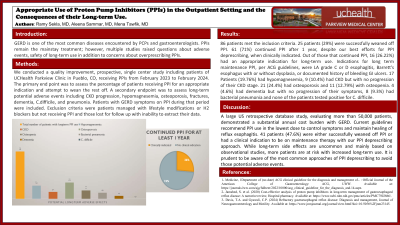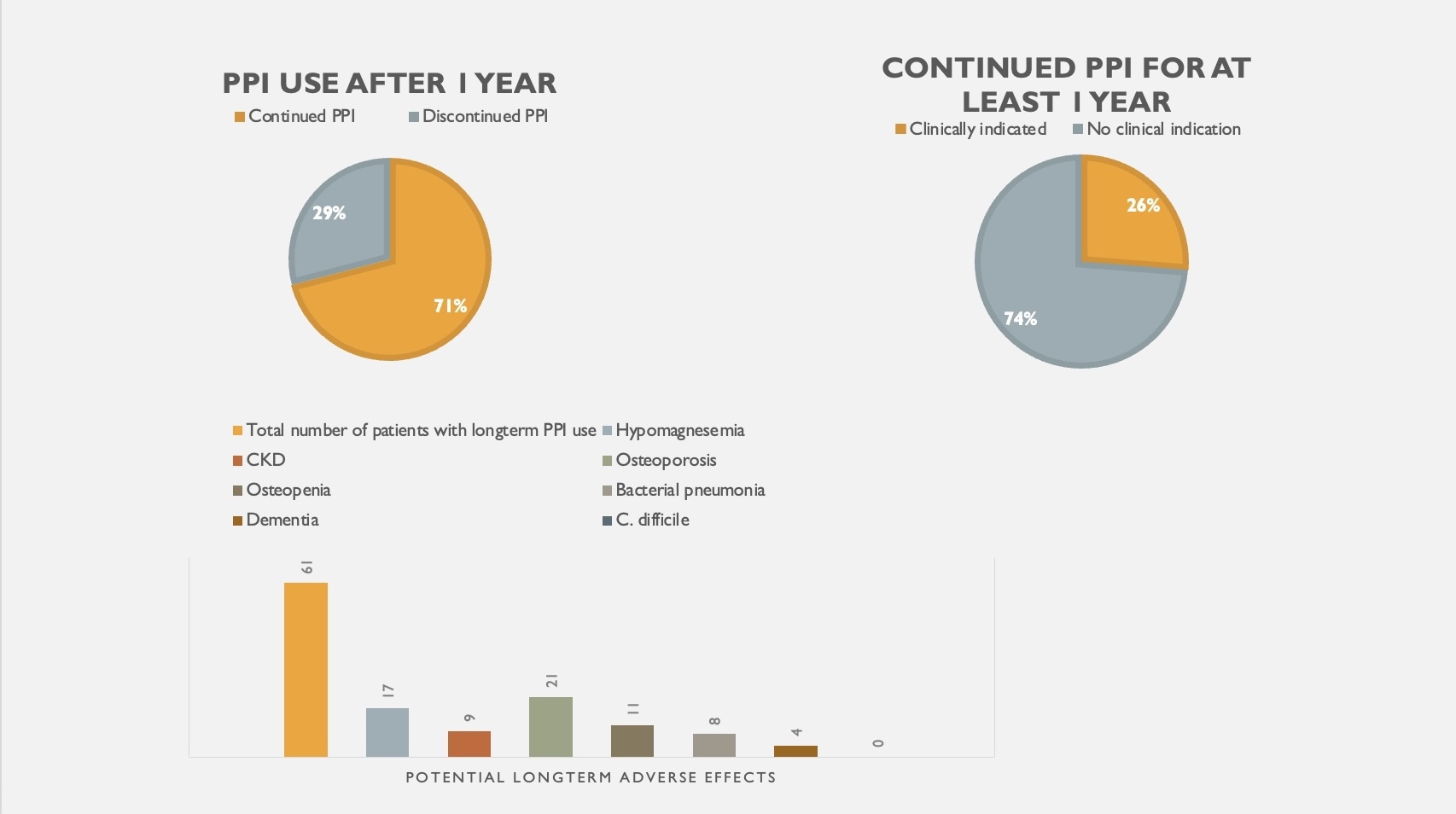Monday Poster Session
Category: Stomach
P3332 - Appropriate Use of PPIs in the Outpatient Setting and the Consequences of their Long-term Use
Monday, October 28, 2024
10:30 AM - 4:00 PM ET
Location: Exhibit Hall E

Has Audio
- RS
Ramy Sekla, MD
Parkview Medical Center
Pueblo, CO
Presenting Author(s)
Ramy Sekla, MD1, Mena Tawfik, MD2, Aleena Sammar, MD2, Kourtney Aylor-Lee, DO3
1Parkview Medical Center, Pueblo, CO; 2Parkview Health Center, Pueblo, CO; 3UChealth Parkview Medical Center, Pueblo, CO
Introduction: GERD is one of the most common diseases encountered by PCPs and gastroenterologists. PPIs remain the mainstay treatment; however, multiple studies raised questions about adverse events, safety of long-term use in addition to concerns about overprescribing PPIs.
Methods: We conducted a quality improvement, prospective, single center study including patients of UCHealth Parkview Clinic in Pueblo, CO, receiving PPIs from February 2023 to February 2024. The primary end point was to assess the percentage of patients receiving PPI for an appropriate indication and attempt to wean the rest off. A secondary endpoint was to assess long-term potential adverse events including CKD progression, hypomagnesemia, osteoporosis, fractures, dementia, C.difficile, and pneumonia. Patients with GERD symptoms on PPI during that period were included. Exclusion criteria were patients managed with lifestyle modifications or H2 blockers but not receiving PPI and those lost for follow up with inability to extract their data.
Results: 86 patients met the inclusion criteria. 25 patients (29%) were successfully weaned off PPI. 61 (71%) continued PPI after 1 year, despite our best efforts for PPI deprescribing, when clinically indicated. Out of those that continued PPI, 16 (26.22%) had an appropriate indication for long-term use. Indications for long term maintenance PPI, per ACG guidelines, were LA grade C or D esophagitis, Barrett’s esophagus with or without dysplasia, or documented history of bleeding GI ulcers. 17 Patients (19.76%) had hypomagnesemia, 9 (10.4%) had CKD but with no progression of their CKD stage. 21 (24.4%) had osteoporosis and 11 (12.79%) with osteopenia. 4 (4.6%) had dementia but with no progression of their symptoms, 8 (9.3%) had bacterial pneumonia and none of the patients tested positive for C. difficile.
Discussion: A large US retrospective database study, evaluating more than 50,000 patients, demonstrated a substantial annual cost burden with GERD. Current guidelines recommend PPI use in the lowest dose to control symptoms and maintain healing of reflux esophagitis. 41 patients (47.6%) were either successfully weaned off PPI or had a clinical indication to be on maintenance therapy with our PPI deprescribing approach. While long-term side effects are uncommon and mainly based on observational studies, more patients are at risk with increased long-term use. It is prudent to be aware of the most common approaches of PPI deprescribing to avoid those potential adverse events.

Disclosures:
Ramy Sekla, MD1, Mena Tawfik, MD2, Aleena Sammar, MD2, Kourtney Aylor-Lee, DO3. P3332 - Appropriate Use of PPIs in the Outpatient Setting and the Consequences of their Long-term Use, ACG 2024 Annual Scientific Meeting Abstracts. Philadelphia, PA: American College of Gastroenterology.
1Parkview Medical Center, Pueblo, CO; 2Parkview Health Center, Pueblo, CO; 3UChealth Parkview Medical Center, Pueblo, CO
Introduction: GERD is one of the most common diseases encountered by PCPs and gastroenterologists. PPIs remain the mainstay treatment; however, multiple studies raised questions about adverse events, safety of long-term use in addition to concerns about overprescribing PPIs.
Methods: We conducted a quality improvement, prospective, single center study including patients of UCHealth Parkview Clinic in Pueblo, CO, receiving PPIs from February 2023 to February 2024. The primary end point was to assess the percentage of patients receiving PPI for an appropriate indication and attempt to wean the rest off. A secondary endpoint was to assess long-term potential adverse events including CKD progression, hypomagnesemia, osteoporosis, fractures, dementia, C.difficile, and pneumonia. Patients with GERD symptoms on PPI during that period were included. Exclusion criteria were patients managed with lifestyle modifications or H2 blockers but not receiving PPI and those lost for follow up with inability to extract their data.
Results: 86 patients met the inclusion criteria. 25 patients (29%) were successfully weaned off PPI. 61 (71%) continued PPI after 1 year, despite our best efforts for PPI deprescribing, when clinically indicated. Out of those that continued PPI, 16 (26.22%) had an appropriate indication for long-term use. Indications for long term maintenance PPI, per ACG guidelines, were LA grade C or D esophagitis, Barrett’s esophagus with or without dysplasia, or documented history of bleeding GI ulcers. 17 Patients (19.76%) had hypomagnesemia, 9 (10.4%) had CKD but with no progression of their CKD stage. 21 (24.4%) had osteoporosis and 11 (12.79%) with osteopenia. 4 (4.6%) had dementia but with no progression of their symptoms, 8 (9.3%) had bacterial pneumonia and none of the patients tested positive for C. difficile.
Discussion: A large US retrospective database study, evaluating more than 50,000 patients, demonstrated a substantial annual cost burden with GERD. Current guidelines recommend PPI use in the lowest dose to control symptoms and maintain healing of reflux esophagitis. 41 patients (47.6%) were either successfully weaned off PPI or had a clinical indication to be on maintenance therapy with our PPI deprescribing approach. While long-term side effects are uncommon and mainly based on observational studies, more patients are at risk with increased long-term use. It is prudent to be aware of the most common approaches of PPI deprescribing to avoid those potential adverse events.

Figure: Graphs
Disclosures:
Ramy Sekla indicated no relevant financial relationships.
Mena Tawfik indicated no relevant financial relationships.
Aleena Sammar indicated no relevant financial relationships.
Kourtney Aylor-Lee indicated no relevant financial relationships.
Ramy Sekla, MD1, Mena Tawfik, MD2, Aleena Sammar, MD2, Kourtney Aylor-Lee, DO3. P3332 - Appropriate Use of PPIs in the Outpatient Setting and the Consequences of their Long-term Use, ACG 2024 Annual Scientific Meeting Abstracts. Philadelphia, PA: American College of Gastroenterology.
